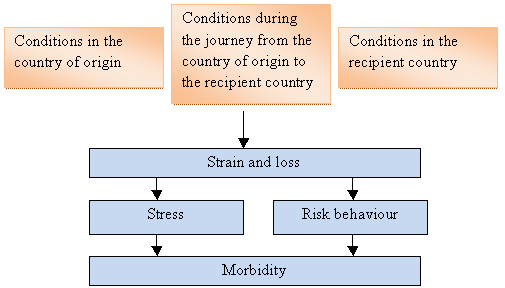1- Not getting an adequate amount of restful sleep
Sleeping disorders affect metabolism and hormones responsible for regulating hunger and appetite(leptin and ghrelin). Leptin (also called the starvation hormone) secretion occurs during sleeping time to suppress hunger and signal that brain has had enough to eat. When the body is not at rest, ghrelin hormone is produced to increase appetite -often time for fats and sweets.
2- Sitting down for too long
Sitting down for too long increase the likelihood of having the following: high blood pressure, cardiovascular complications, osteoporosis, decreasing of arteries diameter( thus narrowing blood circulation), and weight gain( due to the decrease of metabolism's activity). Few tips would include: standing up every hour especially when working in offices; taking stairs instead of escalators; walking in the building for few minutes; eating lunch while remaining stand; doing few stretches.
3- Hormonal disorders
Doctors recommend consultations for those who have hormonal disorders and can't shade few extra fats. Hormonal problems often include the malfunctioning of the thyroid gland- which doesn't make enough thyroid hormone to get the body running normally. New researchers also underscore polycystic ovarian syndrome whereby the growth of small cysts in women ovaries aren't harmful but create hormone imbalances- which affect the well functioning of internal organs.
4- Being stressed and not getting enough relaxation can cause weight gain
Stress increases the production of cortisol which in many cases, triggers appetite for foods.....
5- Craving for sugar and artificial sweeteners is a real killer.
Those sugars are found in candies, cookies, sodas, precooked cuisines, etc..... Artificial sweeteners increase the likelihood of developing obesity while slowing down the metabolism.
6- Not getting sufficient amount of water in the body.
Water is critically important for the body survival: cleanses the system, boosts the metabolism, hydrate the skin, eliminates toxins, suppress appetite for more food( especially when drinking water prior to eating).
7- Physical activity: choosing the right exercise in order to burn calories
One way to loose weight consists of doing cardio: running, walking, climbing upstairs, swimming, and bicycling. These physical activities help in burning calories. Stretching everyday for 5 to 10 minutes has been proven helpful in reducing injury and maintaining healthy muscles.
8- Not getting enough proteins
Proteins are good for boosting metabolism while burning calories. Moreover, when the body gets enough proteins( nuts, eggs, seeds, fish, lean meat, yogurt, lentils, beans), they feel the stomach and diminish hunger.
9- Not increasing your fibers intake
They are found in fruits and vegetables(potatoes, lentils, peas, broccoli, black beans, raspberries, avocados, brown rice, pasta, mango, guava, spinach, carrots, etc.... Fibers have the capacity to reduce appetite; they are absorbed slowly; they help feeling full after eating so that the body may snack less.
10- Water retention in the body also impedes the ability to lose weight. It can occur as a result of sitting down or standing for too long; eating too much salt; blood not flowing properly through the body; experiencing some side effects from certain medicines( must be check with personal physician); Hormonal disorders as mentioned earlier with thyroid;
11- Being too strict when following a particular diet in order to lose weight can become detrimental in the sense that you deprive yourself of what you like- and your body craves for these things.
Quite often it is recommended to maintain a balanced diet and avoid skipping meals when trying to lose weight. This means that, trying to eat what you like every now and then at smaller proportions without completely eliminating these guilty pleasures from your plate.
12- Not eating the good fats( nuts, seeds, avocados, fish)
These goods fats feel up and reduce appetite for snacking.
13- Skipping meals and eating late at night is such a bad idea, especially the breakfast which in fact provides a good body support throughout the day. Instead of skipping breakfast, it would be preferable to skip dinner and have fruits and/or salad in the evening time.
14- the last thing and probably the hardest one is the ability to adopting and maintaining a healthy lifestyle even after these extra pounds have come off. Changing diets and adopting a healthy lifestyle must be perceived as a long-term and lasting solution.
Artificial sweeteners






